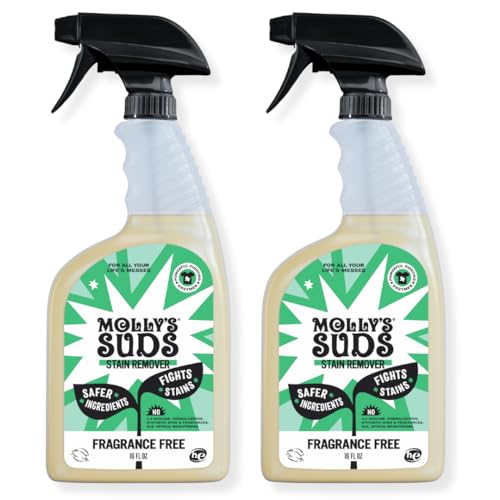
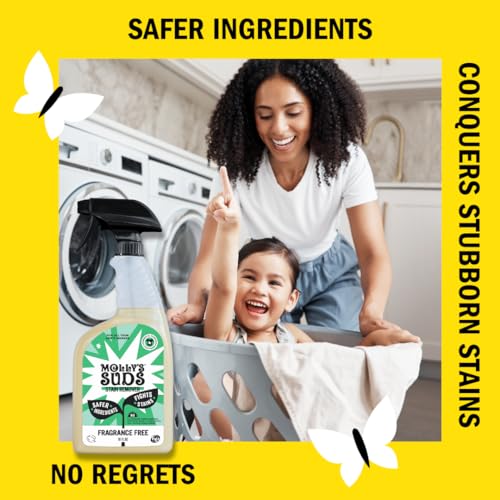
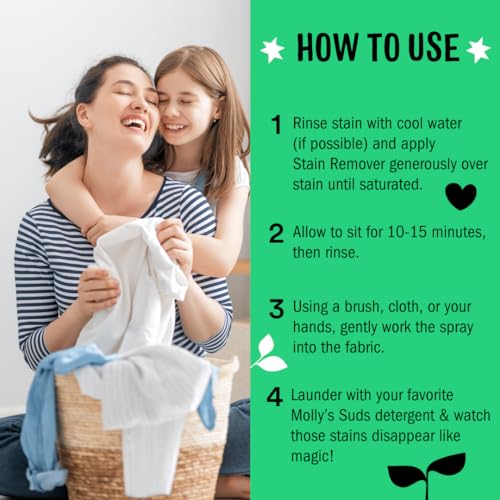
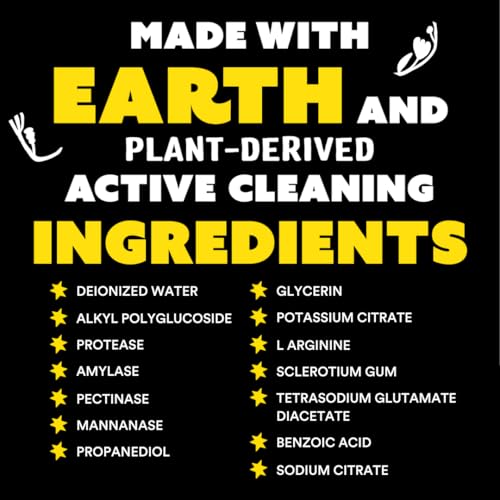
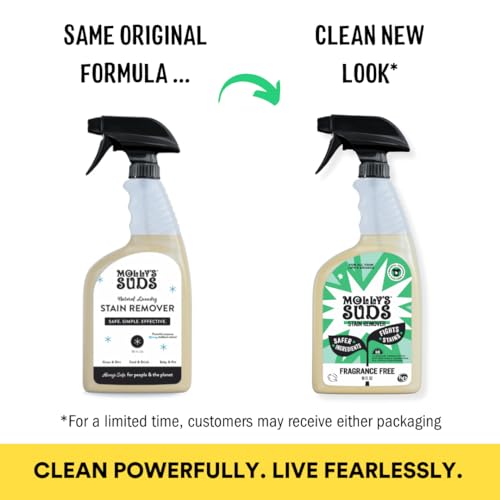
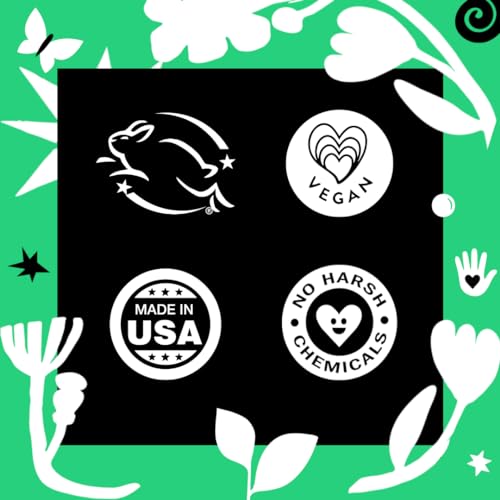
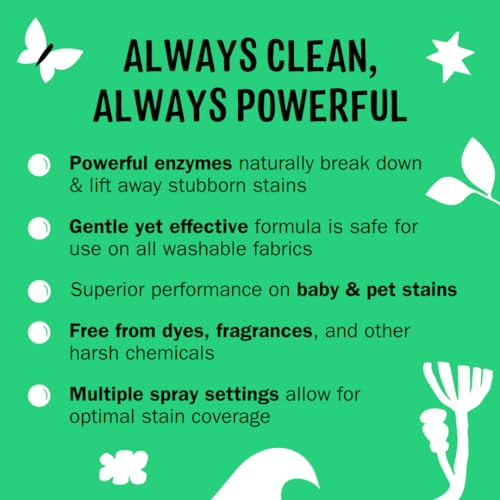
Molly's Suds Stain Remover Spray - Powerful on Baby & Pet Stains, Plant-Derived - 16oz, 2 Pack


Benzyl Alcohol
High RiskBenzyl alcohol is a naturally occurring and synthetic aromatic alcohol commonly used as a solvent, preservative, and fragrance ingredient in various products. It is found in both plant sources and as a synthetic compound, functioning primarily to maintain product stability and enhance fragrance profiles.
Sustai Insights
Benzyl alcohol serves effectively as a preservative and solvent, contributing to product stability and sensory qualities. However, it poses potential health risks, particularly as an allergen, with high concern for immunotoxicity. Environmental risks include being a pollutant with low bioaccumulation potential. Regulatory agencies have established restrictions on its use in certain products. Overall, the risk level associated with benzyl alcohol is assessed as high, necessitating careful consideration of its use and potential alternatives.
Protease
Medium RiskProtease is an enzyme capable of hydrolyzing proteins into smaller peptides or amino acids, facilitating various biological processes. It is commonly used in food processing, detergents, and pharmaceuticals for its ability to break down proteins, enhancing digestion and improving product efficacy.
Sustai Insights
Protease offers functional benefits in various applications, including digestion enhancement and protein breakdown in food processing. While generally considered low risk for carcinogenicity and developmental toxicity, it poses moderate allergy and immunotoxicity concerns. Additionally, it is not currently restricted by regulatory bodies. Environmental risks are minimal, though care should be taken regarding exposure levels. Overall, its risk level is assessed as medium, suggesting caution in usage practices. Alternatives such as plant-based enzymes may provide safer options.
Glyceryl Undecylenate
Medium RiskGlyceryl undecylenate is an ester of glycerin and undecylenic acid, commonly used as a skin-conditioning agent and emulsifier in cosmetic formulations. It aids in improving the texture and spreadability of products, contributing to their overall performance.
Sustai Insights
Glyceryl undecylenate offers functional benefits as an effective emulsifier and skin-conditioning agent. It is generally recognized as safe with low concerns regarding carcinogenicity, allergies, and reproductive toxicity. However, moderate use restrictions exist, and regulatory advisories should be considered. Environmental risks are minimal, with no significant pollutant or bioaccumulation potential noted. Overall, the risk assessment indicates a medium-level risk, making it essential to follow safe usage practices and consider alternatives like glycerin or natural oils for sustainability.
Glyceryl Caprylate
Low RiskGlyceryl caprylate is a monoester of glycerin and caprylic acid, commonly used in cosmetics and personal care products as an emulsifier and skin-conditioning agent. It helps stabilize formulations and improve the texture and feel on the skin.
Sustai Insights
Glyceryl caprylate offers functional benefits as an effective emulsifier and skin-conditioning agent, enhancing product performance. It is biodegradable and considered sustainably sourced. Health risks are low, with minimal concerns regarding carcinogenicity, allergenic potential, and endocrine disruption. Environmental risks are also low, with no significant pollutant or bioaccumulation potential identified. Regulatory status is favorable, with no major restrictions. Overall, glyceryl caprylate maintains a low risk profile, making it a suitable ingredient for use in cosmetic formulations.
Amylase
Low RiskAmylase is an enzyme that catalyzes the breakdown of starches into sugars. It is commonly used in food processing, detergents, and other industrial applications to enhance product functionality. Its effectiveness depends on specific conditions, such as temperature and pH, making it versatile in applications ranging from baking to stain removal.
Sustai Insights
Amylase offers functional benefits by efficiently breaking down starches, enhancing food texture and cleaning performance. It is widely recognized as safe and biodegradable, aligning with sustainability goals. However, exposure may pose irritation risks for individuals with enzyme allergies, particularly through inhalation or skin contact. Regulatory assessments classify amylase as generally safe, with no carcinogenic or endocrine-disrupting properties reported. Environmental risks are minimal due to its natural degradability, and its use in products typically adheres to stringent safety standards. While alternative enzymes exist, amylase remains a preferred choice due to its efficiency and low overall risk, which is considered manageable with appropriate precautions.
Coco Glucoside
Low RiskCoco-glucoside is a synthetic surfactant produced from coconut oil and glucose. It serves primarily as a cleansing and emulsifying agent in personal care products, helping to create lather and improve the texture of formulations.
Sustai Insights
Coco-glucoside offers effective cleansing properties and is biodegradable, making it a more sustainable option in formulations. Health risks are generally low, with minimal concerns regarding irritation and allergies. Environmental hazards are also low, as it does not bioaccumulate. Regulatory bodies do not impose significant restrictions. Safe usage practices should be followed, and alternatives may include other mild surfactants. Overall, the risk level associated with coco-glucoside is low.
Propanediol
Low RiskPropanediol is a glycol compound commonly used in cosmetic and personal care products as a solvent, humectant, and skin-conditioning agent. It serves to enhance the texture and moisture retention of formulations, contributing to overall product efficacy.
Sustai Insights
Propanediol offers functional benefits such as effective moisture retention and improved product application. It is considered low-risk in terms of health concerns, with minimal associations with carcinogenicity, allergies, or reproductive toxicity. Environmentally, it has low pollutant potential and is not bioaccumulative. Regulatory bodies have not placed restrictions on its use. Despite concerns regarding enhanced skin absorption and potential endocrine disruption, the overall assessment indicates low risk. Safe usage practices should be followed, and alternatives like glycerin or other plant-based humectants can be considered.
Xanthan Gum
Low RiskXanthan gum is a polysaccharide, a sugar-based compound produced by the fermentation of glucose or sucrose. It is commonly used as a thickening agent and stabilizer in various food and cosmetic products due to its ability to improve texture and prevent ingredient separation.
Sustai Insights
Xanthan gum serves effectively as a thickener and stabilizer, enhancing product texture and consistency. It is biodegradable and typically derived from renewable sources, supporting sustainability efforts. Health risks are minimal, with low concerns regarding carcinogenicity, allergies, and reproductive toxicity. Environmental impact is similarly low, posing no significant hazards. Regulatory agencies, including the FDA, regard it as safe for use, with no significant restrictions. Overall, xanthan gum is assessed as low risk, making it a suitable ingredient in formulations.
Vegetarian Glycerin
Low RiskVegetarian glycerin, also known as glycerol, is a colorless, odorless, and viscous liquid derived from plant sources. It is primarily used as a humectant, solvent, and emollient in various personal care products, helping to retain moisture and improve texture.
Sustai Insights
Vegetarian glycerin offers functional benefits as an effective humectant, promoting hydration and skin smoothness. It is biodegradable and typically sustainably sourced. Health risks associated with glycerin are low, with no significant concerns for carcinogenicity, allergens, or reproductive toxicity. Environmental risks are minimal, and it is not subject to major regulatory warnings. Overall, the risk level for this ingredient is low, making it a safe choice in formulations. Safe usage practices include ensuring proper concentrations in products, and alternatives such as propylene glycol exist but may have differing properties.
Potassium Citrate
Low RiskPotassium citrate is a potassium salt of citric acid, commonly used in food, beverages, and cosmetic products as a buffering agent and preservative. It helps maintain pH levels and enhances flavor stability, while also serving as a source of potassium in dietary applications.
Sustai Insights
Potassium citrate offers functional benefits as a buffering agent and preservative, with low potential for health risks such as carcinogenicity, allergies, or reproductive toxicity. Environmentally, it presents minimal risks, being non-bioaccumulative and not contributing significantly to pollution. Regulatory bodies have not imposed major restrictions on its use. Overall, the risk level associated with potassium citrate is low, and it is generally regarded as safe when used appropriately. Alternatives may include other potassium-based salts, though potassium citrate remains a well-regarded option.
Glyceryl Caprylate
Low RiskGlyceryl caprylate is a monoester of glycerin and caprylic acid, commonly used in cosmetics and personal care products as an emulsifier and skin-conditioning agent. It helps stabilize formulations and improve the texture and feel on the skin.
Sustai Insights
Glyceryl caprylate offers functional benefits as an effective emulsifier and skin-conditioning agent, enhancing product performance. It is biodegradable and considered sustainably sourced. Health risks are low, with minimal concerns regarding carcinogenicity, allergenic potential, and endocrine disruption. Environmental risks are also low, with no significant pollutant or bioaccumulation potential identified. Regulatory status is favorable, with no major restrictions. Overall, glyceryl caprylate maintains a low risk profile, making it a suitable ingredient for use in cosmetic formulations.
Amylase
Low RiskAmylase is an enzyme that catalyzes the breakdown of starches into sugars. It is commonly used in food processing, detergents, and other industrial applications to enhance product functionality. Its effectiveness depends on specific conditions, such as temperature and pH, making it versatile in applications ranging from baking to stain removal.
Sustai Insights
Amylase offers functional benefits by efficiently breaking down starches, enhancing food texture and cleaning performance. It is widely recognized as safe and biodegradable, aligning with sustainability goals. However, exposure may pose irritation risks for individuals with enzyme allergies, particularly through inhalation or skin contact. Regulatory assessments classify amylase as generally safe, with no carcinogenic or endocrine-disrupting properties reported. Environmental risks are minimal due to its natural degradability, and its use in products typically adheres to stringent safety standards. While alternative enzymes exist, amylase remains a preferred choice due to its efficiency and low overall risk, which is considered manageable with appropriate precautions.
Coco Glucoside
Low RiskCoco-glucoside is a synthetic surfactant produced from coconut oil and glucose. It serves primarily as a cleansing and emulsifying agent in personal care products, helping to create lather and improve the texture of formulations.
Sustai Insights
Coco-glucoside offers effective cleansing properties and is biodegradable, making it a more sustainable option in formulations. Health risks are generally low, with minimal concerns regarding irritation and allergies. Environmental hazards are also low, as it does not bioaccumulate. Regulatory bodies do not impose significant restrictions. Safe usage practices should be followed, and alternatives may include other mild surfactants. Overall, the risk level associated with coco-glucoside is low.
Propanediol
Low RiskPropanediol is a glycol compound commonly used in cosmetic and personal care products as a solvent, humectant, and skin-conditioning agent. It serves to enhance the texture and moisture retention of formulations, contributing to overall product efficacy.
Sustai Insights
Propanediol offers functional benefits such as effective moisture retention and improved product application. It is considered low-risk in terms of health concerns, with minimal associations with carcinogenicity, allergies, or reproductive toxicity. Environmentally, it has low pollutant potential and is not bioaccumulative. Regulatory bodies have not placed restrictions on its use. Despite concerns regarding enhanced skin absorption and potential endocrine disruption, the overall assessment indicates low risk. Safe usage practices should be followed, and alternatives like glycerin or other plant-based humectants can be considered.
Xanthan Gum
Low RiskXanthan gum is a polysaccharide, a sugar-based compound produced by the fermentation of glucose or sucrose. It is commonly used as a thickening agent and stabilizer in various food and cosmetic products due to its ability to improve texture and prevent ingredient separation.
Sustai Insights
Xanthan gum serves effectively as a thickener and stabilizer, enhancing product texture and consistency. It is biodegradable and typically derived from renewable sources, supporting sustainability efforts. Health risks are minimal, with low concerns regarding carcinogenicity, allergies, and reproductive toxicity. Environmental impact is similarly low, posing no significant hazards. Regulatory agencies, including the FDA, regard it as safe for use, with no significant restrictions. Overall, xanthan gum is assessed as low risk, making it a suitable ingredient in formulations.
Protease
Medium RiskProtease is an enzyme capable of hydrolyzing proteins into smaller peptides or amino acids, facilitating various biological processes. It is commonly used in food processing, detergents, and pharmaceuticals for its ability to break down proteins, enhancing digestion and improving product efficacy.
Sustai Insights
Protease offers functional benefits in various applications, including digestion enhancement and protein breakdown in food processing. While generally considered low risk for carcinogenicity and developmental toxicity, it poses moderate allergy and immunotoxicity concerns. Additionally, it is not currently restricted by regulatory bodies. Environmental risks are minimal, though care should be taken regarding exposure levels. Overall, its risk level is assessed as medium, suggesting caution in usage practices. Alternatives such as plant-based enzymes may provide safer options.
Vegetarian Glycerin
Low RiskVegetarian glycerin, also known as glycerol, is a colorless, odorless, and viscous liquid derived from plant sources. It is primarily used as a humectant, solvent, and emollient in various personal care products, helping to retain moisture and improve texture.
Sustai Insights
Vegetarian glycerin offers functional benefits as an effective humectant, promoting hydration and skin smoothness. It is biodegradable and typically sustainably sourced. Health risks associated with glycerin are low, with no significant concerns for carcinogenicity, allergens, or reproductive toxicity. Environmental risks are minimal, and it is not subject to major regulatory warnings. Overall, the risk level for this ingredient is low, making it a safe choice in formulations. Safe usage practices include ensuring proper concentrations in products, and alternatives such as propylene glycol exist but may have differing properties.
Potassium Citrate
Low RiskPotassium citrate is a potassium salt of citric acid, commonly used in food, beverages, and cosmetic products as a buffering agent and preservative. It helps maintain pH levels and enhances flavor stability, while also serving as a source of potassium in dietary applications.
Sustai Insights
Potassium citrate offers functional benefits as a buffering agent and preservative, with low potential for health risks such as carcinogenicity, allergies, or reproductive toxicity. Environmentally, it presents minimal risks, being non-bioaccumulative and not contributing significantly to pollution. Regulatory bodies have not imposed major restrictions on its use. Overall, the risk level associated with potassium citrate is low, and it is generally regarded as safe when used appropriately. Alternatives may include other potassium-based salts, though potassium citrate remains a well-regarded option.
Benzyl Alcohol
High RiskBenzyl alcohol is a naturally occurring and synthetic aromatic alcohol commonly used as a solvent, preservative, and fragrance ingredient in various products. It is found in both plant sources and as a synthetic compound, functioning primarily to maintain product stability and enhance fragrance profiles.
Sustai Insights
Benzyl alcohol serves effectively as a preservative and solvent, contributing to product stability and sensory qualities. However, it poses potential health risks, particularly as an allergen, with high concern for immunotoxicity. Environmental risks include being a pollutant with low bioaccumulation potential. Regulatory agencies have established restrictions on its use in certain products. Overall, the risk level associated with benzyl alcohol is assessed as high, necessitating careful consideration of its use and potential alternatives.
Glyceryl Undecylenate
Medium RiskGlyceryl undecylenate is an ester of glycerin and undecylenic acid, commonly used as a skin-conditioning agent and emulsifier in cosmetic formulations. It aids in improving the texture and spreadability of products, contributing to their overall performance.
Sustai Insights
Glyceryl undecylenate offers functional benefits as an effective emulsifier and skin-conditioning agent. It is generally recognized as safe with low concerns regarding carcinogenicity, allergies, and reproductive toxicity. However, moderate use restrictions exist, and regulatory advisories should be considered. Environmental risks are minimal, with no significant pollutant or bioaccumulation potential noted. Overall, the risk assessment indicates a medium-level risk, making it essential to follow safe usage practices and consider alternatives like glycerin or natural oils for sustainability.
Experience the power of nature with Molly's Suds Natural Laundry Stain Remover Spray. Perfect for families with babies and pets, this gentle yet effective formula tackles tough stains without harsh chemicals.
- Super Stain Fighting Power: Harnesses a proprietary blend of enzymes to effectively combat a wide range of stains, including baby food, grease, and wine.
- Gentle, Versatile Formula: Safe for all machine washable fabrics, including delicate items and upholstery, ensuring versatile cleaning without damage.
- Plant Science: Utilizes naturally occurring enzymes for rapid stain breakdown, making it an efficient choice for tough messes.
- Clean Without Compromise: Made from plant-derived and bio-based ingredients, this vegan and cruelty-free formula is ideal for those with skin sensitivities.
- What’s Included: Comes with two 16 fl oz bottles of unscented stain spray, providing ample supply for all your laundry needs.
Make informed choices for your home and family with a product that values health, safety, and environmental responsibility.
Subscribe & Save with Sustai
- Best Price Guarantee: Always enjoy the lowest prices on sustainable home essentials.
- No Surprises: We’ll notify you before shipping. No hidden fees, ever.
- You’re in Charge: Change, pause, or cancel your subscription anytime with ease.
- Eco-Friendly Deliveries: Our grouped shipments mean less packaging and lower emissions.
Join us on a sustainable journey. Special offers for a limited time! Prices and promotions may change.
Recommended Products
Experience the power of nature with Molly's Suds Natural Laundry Stain Remover Spray. Perfect for families with babies and pets, this gentle yet effective formula tackles tough stains without harsh chemicals.
- Super Stain Fighting Power: Harnesses a proprietary blend of enzymes to effectively combat a wide range of stains, including baby food, grease, and wine.
- Gentle, Versatile Formula: Safe for all machine washable fabrics, including delicate items and upholstery, ensuring versatile cleaning without damage.
- Plant Science: Utilizes naturally occurring enzymes for rapid stain breakdown, making it an efficient choice for tough messes.
- Clean Without Compromise: Made from plant-derived and bio-based ingredients, this vegan and cruelty-free formula is ideal for those with skin sensitivities.
- What’s Included: Comes with two 16 fl oz bottles of unscented stain spray, providing ample supply for all your laundry needs.
Make informed choices for your home and family with a product that values health, safety, and environmental responsibility.

You can have at most 2 Sustainable Steals products in your cart
Customer Reviews
Customers’ View
Customers appreciate the effectiveness and environmentally friendly formulation of the Molly's Suds Unscented Stain Spray. Many users report that it effectively removes a variety of tough stains, including those from food and baby-related messes, often on the first wash. The product is praised for its non-toxic ingredients, making it a reliable choice for families with sensitivities. However, customers have noted issues with the spray bottle's functionality, including leakage and inconsistent spray quality, which detracts from the overall experience. Despite these concerns, the eco-friendly and gentle nature of the stain remover resonates well with health-conscious consumers. Overall, users find this product to be a solid option for maintaining fabric cleanliness while adhering to sustainable practices.
AI-generated from the text of customer reviewsThis product is rated 4.5 of 5.0 stars.
It has received 13 reviews.




